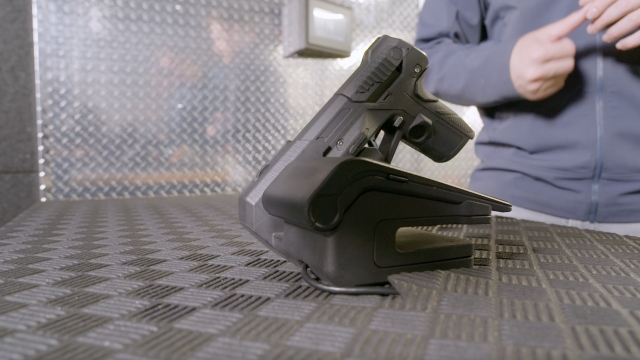At a firing range in an industrial section of Broomfield, Colorado, near Denver, Kai Kloepfer loads a 9-millimeter pistol and pulls the trigger.
There's a loud bang and a new hole in the paper target. He hands the gun to a reporter, who tries to fire the gun. Nothing happens.
The gun won't fire because the reporter is not an authorized user. It is a so-called smart gun, a mashup of pistol and programming designed to keep it from firing in the wrong hands.
"That's really the key part," Kloepfer says as he lowers the gun. "As soon as I put this down, it's going to lock."
Manufactured by BioFire, the weapon is marketed as the world's first-ever biometric smart gun. It unlocks only for an authorized user by incorporating built-in fingerprint and facial-recognition sensors into the gun, just like on a smartphone.
Lights on the gun indicate its status.
"The white light means it's trying to authenticate, it's trying to recognize me," Kloepfer demonstrates. "The green lights mean it's unlocked and ready to go."
Back in 2012, Kloepfer was a high school sophomore with a talent for engineering. When a gunman killed 12 people in an Aurora, Colorado movie theater, it inspired him to build a smart gun as a science fair project.
"I was 16 and it was illegal for me to own a gun at the time," Kloepfer says.
SEE MORE: Gun violence has become a part of America's culture
A few years later, in 2016, Kloepfer left his engineering and business studies at MIT and founded BioFire. The company is currently focused on guns for home defense. Marketing videos on the company website show pistols perched on shelves in living rooms and kitchens.
"For home defense in particular, you need to have fast access to that firearm," says Kloepfer, now 26. "That leads to a lot of people leaving their firearms totally unsecured."
Kloepfer believes his smart gun will help prevent some of the tens of thousands of gun suicides and accidental shootings every year.
"My mission is, firearms are now one of the leading causes of death for children, teenagers in America. And that's not something that any gun owner I've ever talked to wants, right? Nobody wants a kid to find their gun," he said.
BioFire says polls show gun owners strongly support the idea of buying a smart gun, but there are skeptics who do not trust the electronic technology, or feel that smart guns can be tracked by government agencies.
A few years ago, a hacker demonstrated for WIRED how a German company's smart gun could be out-smarted by simply placing cheap magnets next to the firearm.
The National Rifle Association says it isn't against smart guns, but calls the technology "unproven".
"Gun owners will continue to have legitimate concerns about firearms that collect data, can be GPS-tracked or deactivated remotely, or that, by legislative mandate, will phase out access to traditional, mechanical firearms," according to the NRA.
SEE MORE: Why are AR-15-style rifles becoming so popular?
Kloepfer says the BioFire gun has been carefully designed so that it can't be hacked.
"The gun is a completely closed, local, hardened system," Kloepfer says. "So there's no WiFi, Bluetooth, GPS, any sort of radio communications of any kind. It's impossible to remotely compromise the gun in any way. There's no 'kill switch' the government has or anything like that."
BioFire lead designer Bryan Rogers says over the years, their smart gun has gone through hundreds of versions before settling on a futuristic design.
"We knew early on that this was going to be so drastically different from anything out there," Rogers says. "We talk about it being the firearm from fifty to 100 years from now. What does the future look like?"
The BioFire smart gun sells for roughly three times the cost of a similar, traditional firearm. But if Kloepfer can convince buyers his gun is as reliable and quick as traditional handguns, he believes the future will ultimately look a lot safer.
"BioFire has the opportunity to have a substantive impact on what I consider to be one of the most substantive public health problems of my generation. And I don't really see a world where — no matter who's elected — that guns are not going to continue to be a part of American culture," Kloepfer says. "If we can save one kid's life, I would consider that to be a net positive."
Trending stories at Scrippsnews.com




